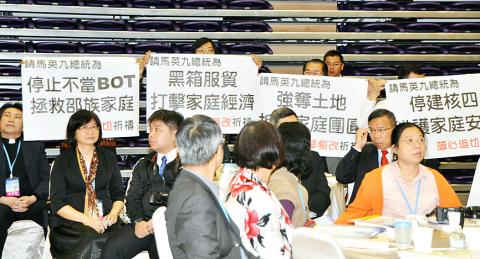President Ma Ying-jeou (馬英九) yesterday said he has heard the public’s complaints about the government, and promised to try to improve its performance amid constant protests against him.
“We’ve heard the people’s voice, and we hope the people give the government more opportunity and time. There are things that we need to do immediately, and there are things that require a little time. We will do it step-by-step,” he said while attending the 13th National Prayer Breakfast in New Taipei City (新北市).
Ma made the comments in response to a protest held at the event, in which several people holding a white banner expressing opposition to several government policies, including the cross-strait services trade agreement, the forced demolition of privately owned houses for urban renewal and the construction of the Fourth Nuclear Power Plant in New Taipei City’s Gongliao District (貢寮).

Photo: CNA
The protesters kept silent during the protest, but were still asked to leave by security. The Presidential Office later accepted a petition from them.
Ma defended the government’s efforts to improve the economy by signing economic pacts with major trade partners and creating more investment opportunities for local businesses.
He also cited the government’s handling of the public discontent over the death of army corporal Hung Chung-chiu (洪仲丘), who died on July 4 after he was confined and forced to do strenuous exercise in extreme heat, and said the government’s move to turn over the trials of military personnel to civilian courts was a positive response.
“This example represents the government’s prompt response to a request in a mature civil society. The government communicates with the people, and takes necessary actions to respond to their requests,” he said.
Later yesterday, while meeting with representatives of the electronic commerce industry at the Presidential Office, Ma said the cross-strait service trade agreement aimed to profit the whole nation, rather than a particular political party or industry.
“Our trade rivals have been speeding up their pace of signing free-trade agreements with mainland China and other nations. The advantages we created via the Economic Cooperation Framework Agreement will disappear soon if we don’t catch up,” he said, calling for the approval of the service trade pact in the legislature.
The pact, which was signed in June and opened market access to 64 local service sectors to Chinese investment, has been under strong public scrutiny over what the opposition and representatives of the service sectors called lack of transparency and prior consultation.
The legislature went on to demand the pact be screened and voted on clause-by-clause.

Taipei has once again made it to the top 100 in Oxford Economics’ Global Cities Index 2025 report, moving up five places from last year to 60. The annual index, which was published last month, evaluated 1,000 of the most populated metropolises based on five indices — economics, human capital, quality of life, environment and governance. New York maintained its top spot this year, placing first in the economics index thanks to the strength of its vibrant financial industry and economic stability. Taipei ranked 263rd in economics, 44th in human capital, 15th in quality of life, 284th for environment and 75th in governance,

Greenpeace yesterday said that it is to appeal a decision last month by the Taipei High Administrative Court to dismiss its 2021 lawsuit against the Ministry of Economic Affairs over “loose” regulations governing major corporate electricity consumers. The climate-related lawsuit — the first of its kind in Taiwan — sought to require the government to enforce higher green energy thresholds on major corporations to reduce emissions in light of climate change and an uptick in extreme weather. The suit, filed by Greenpeace East Asia, the Environmental Jurists Association and four individual plaintiffs, was dismissed on May 8 following four years of litigation. The

A former officer in China’s People’s Liberation Army (PLA) who witnessed the aftermath of the 1989 Tiananmen Square massacre has warned that Taiwan could face a similar fate if China attempts to unify the country by force. Li Xiaoming (李曉明), who was deployed to Beijing as a junior officer during the crackdown, said Taiwanese people should study the massacre carefully, because it offers a glimpse of what Beijing is willing to do to suppress dissent. “What happened in Tiananmen Square could happen in Taiwan too,” Li told CNA in a May 22 interview, ahead of the massacre’s 36th anniversary. “If Taiwanese students or

The New Taipei City Government would assist relatives of those killed or injured in last month’s car-ramming incident in Sansia District (三峽) to secure compensation, Mayor Hou You-yi (侯友宜) said yesterday, two days after the driver died in a hospital. “The city government will do its best to help the relatives of the car crash incident seek compensation,” Hou said. The mayor also said that the city’s Legal Affairs, Education and Social Welfare departments have established a joint mechanism to “provide coordinated assistance” to victims and their families. Three people were killed and 12 injured when a car plowed into schoolchildren and their